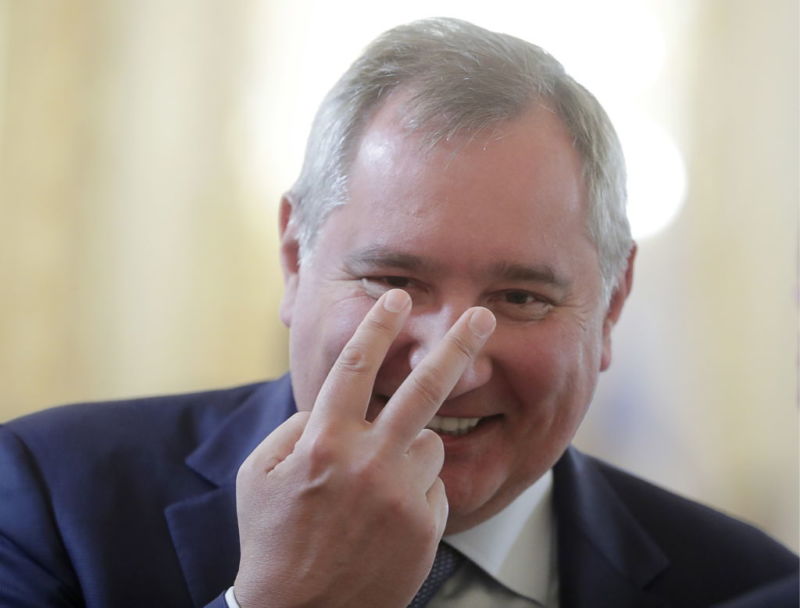
Mikhail Metzel/TASS via Getty Images
This weekend it happened again. Both Bloomberg and Axios reported that Russia is leaving the International Space Station due to sanctions imposed on Russia by the United States. Each of these stories received a lot of attention. And each of these stories was wrong too.
This has become a predictable pattern in recent weeks: Dmitry Rogozin, the articulate leader of the Russian space company, will give an interview to a Russian space publication, and then Western news outlets will pick up on everything Rogozin says and draw conclusions that are simply incorrect.
This is specifically what Rogozin said on state television this weekend: “The decision has already been made, we are under no obligation to talk about it publicly. I can only say this – in accordance with our obligations, we will inform our partners about the end of our work on the ISS with one year’s notice.”
2024 or beyond
This may sound ominous, but that is the misinterpretation of Rogozin’s words. There’s even positive news in there, with Rogozin saying that Russia will give NASA and its other partners a year’s notice before they leave. This is more than enough time for NASA and its commercial partners, Northrop Grumman, SpaceX and Boeing, to work together to save the greater western portion of the space station.
But when will that departure to which Rogozin refers come? The current operating agreement between the 15 partner countries that manage the International Space Station will expire in 2024. The United States and most other partner countries have indicated that they want to continue operating the nearly 25-year-old space station. to 2030. Russia is still considering its options, although NASA administrator Bill Nelson said last week that he expects Russia to continue participating beyond 2024.
The reality is that, after more than two months of ugly fighting in Ukraine, the relationship between NASA and Roscosmos has largely risen above geopolitical tensions. There is no indication that this will change in the short term, and in his interview, Rogozin merely reiterates that the country could choose not to renew its partnership beyond 2024. But as he often does, Rogozin makes this statement with a bit of bluff, trying to project power.
What I’ve learned about Dmitry Rogozin over the past ten years is that by far the best policy you can follow towards him is to ignore what he says in public. To better understand 58-year-old Putin Apparatchik’s motivations, I spoke in the background with a former senior NASA official who has been dealing with Rogozin for years.
Understanding Dmitry
“He never wanted this job,” the former NASA source said of Rogozin. “He was essentially demoted and he’s spent his time at Roscosmos trying to get back into Putin’s favor. And so it’s just been an extremely different kind of leadership than we’ve seen before, to the detriment of everyone.”
For reasons unclear, Putin removed Rogozin from the prestigious position of Deputy Prime Minister for Russia’s defense and aerospace industry in May 2018. Rogozin was then given the task of overseeing Roscosmos, which mainly focuses on civilian spaceflight. Rather than bring a space background or industrial expertise to Roscosmos, Rogozin brought his own Russian nationalist politics.
“Going back to the Cold War, there was an unwritten rule in which Roscosmos and NASA would not criticize each other,” the Western source said. “No matter how bad things got on Earth, the two space agencies would never utter a bad word. On the contrary, they would continue to work together and let the politicians fight. Well, that changed dramatically with Rogozin.”
During his time at Roscosmos, Rogozin has fired regular shots at the West, and at NASA and its contractors, such as SpaceX (not to mention accusing journalists of war crimes). However, the fundamental relationship between Roscosmos and NASA has not changed. At the level of astronauts and cosmonauts, engineers and managers, cordial relations continue.
And that is understandable. “As for the overall collaboration on the ISS, the Roscosmos base, even the Roscosmos leadership, is desperate to continue this activity,” the source said. “Because if they get off the ISS, they lose their space program. We’re literally talking about the death of the Russian civilian space program.”
Rogozin, of course, remains the wildcard. He probably wouldn’t hesitate to jettison the space station partnership if it would earn him points with Putin. But that is not what has happened since the outbreak of the war in Ukraine. Rogozin roared and posed, but he has not made any definitive splits with NASA or Russia’s western partners in space station activities. In this case, actions speak much louder than words.

